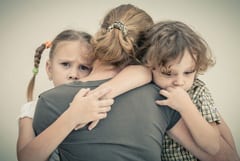MEDICATIONS – WE DO NOT PROVIDE AND/OR PRESCRIBE MEDICATIONS. Although we do not dispense medications, we can assist our clients in locating a Medical Doctor (MD) who will assess the client and may prescribe medications. Current research indicates that the best treatment outcomes are achieved through the combined utilization of medication and cognitive/behavioral psychotherapy.
INSURANCE – We are an independent group practice. We participate in insurance networks and will bill your insurance as a courtesy to you. You will be responsible for your co-pays as per your policy. Please CONTACT US to ensure we are able to bill your insurance. If so, bring a copy of your insurance card.
 A traumatic experience includes but is not limited to: a hurricane, a serious car accident, rape, robbery, assault, physical/sexual abuse, neglect, a warzone, a soldier in combat, and witnessing a murder or domestic violence. A traumatic event is an incident or a series of incidents that when it occurs, the person believes that their safety or the stability of their world or others is in danger. The traumatic event may have caused physical, emotional, psychological distress, or harm. The feelings, emotions, behavior, and physical abilities after the event will vary but it may include experiencing a mental health disorder such as Acute Stress Disorder and/or Post Traumatic Stress Disorder (PTSD).
A traumatic experience includes but is not limited to: a hurricane, a serious car accident, rape, robbery, assault, physical/sexual abuse, neglect, a warzone, a soldier in combat, and witnessing a murder or domestic violence. A traumatic event is an incident or a series of incidents that when it occurs, the person believes that their safety or the stability of their world or others is in danger. The traumatic event may have caused physical, emotional, psychological distress, or harm. The feelings, emotions, behavior, and physical abilities after the event will vary but it may include experiencing a mental health disorder such as Acute Stress Disorder and/or Post Traumatic Stress Disorder (PTSD).
Trauma Treatment
ASANTE recognizes that every trauma event is very personal and is made up of different traumatic moments. Each second of the traumatic event has different levels of life which include: threat, physical violation, and witnessing an injury or death. A trauma-exposed person experiences individual reactions to these different moments that include: changes in feelings, thoughts, and physiological responses; and concerns for the safety of self and others. Events (both good and bad) that occur in the aftermath of the traumatic event introduce additional layers of complexity. The individual may have conflicted feelings, confusion, guilt, regret, and/or anger. The nature of the person’s moment-to-moment reactions is strongly influenced by their prior experience and developmental level. The degree of complexity often increases in cases of multiple or recurrent trauma exposure and in situations where a primary caregiver is a perpetrator of the trauma.
Our staffs are experienced Clinicians who have experience in providing evidence based practices to those who have had a life-changing traumatic event. We offer the following services:
Individual Behavioral Psychotherapy/ Cognitive Behavioral Therapy (CBT)
This involves meeting with a qualified Clinician or counselor. Typically these meetings are once a week for an hour and focus on talking about the events, your reactions to them and how to create positive change in your life. Individual therapy can differ greatly based on the modality used.
This treatment approach looks at the ways in which a person thinks about a problem, their learned responses to triggers associated with the problem and ways in which their thinking impacts their emotional state. This treatment often uses a combination of exposure (thinking about the event or the trigger) and relaxation training along with cognitive restructuring (changing the way you think about or the beliefs you have about) the event. This process tends to “desensitize” a person’s response to reminders of the trauma to lessen the emotional impact. CBT has been well-researched and shown to be effective in the treatment of anxiety symptoms associated with trauma.)
Trauma Treatment for Children and Family Members/Caregivers
In working with children who have experienced trauma careful consideration is given to the treatment modality. Trauma Focused Cognitive Behavior Therapy (TF-CBT) has been found to be effective. More than a dozen scientifically rigorous researches have proven that TF-CBT assists the child and family to recover from the negative effects of traumatic experiences, including PTSD symptoms, depression, and related difficulties. The studies compared TF-CBT to other treatments commonly provided to traumatized children, such as supportive therapy, child-centered therapy, play therapy, or usual community treatment, and showed that children receiving TF-CBT improved faster and more completely than the children who received other treatments.
Research studies show that TF-CBT works:
- For children who have experienced any trauma, including multiple traumas.
- With children from diverse backgrounds.
- In as few as 12 treatment sessions.
- In clinics, schools, homes, residential treatment facilities, and inpatient settings.
- Even if there is no parent or caregiver to participate in treatment.
- For children in foster care.
- In a variety of languages and countries.
TF-CBT is a short-term treatment approach that can work in as few as 12 sessions. It also may be provided for longer periods of time depending on the child’s and family’s needs. Individual sessions for the child and for the parents or caregivers, as well as joint parent-child sessions, are a part of the treatment. As with any therapy, forming a therapeutic relationship with the child and parent is critical to TF-CBT. The specific components of TF-CBT are summarized by the acronym PRACTICE:
- Psycho education is provided to children and their caregivers about the impact of trauma and common childhood reactions. Parenting skills are provided to optimize children’s emotional and behavioral adjustment.
- Relaxation and stress management skills are individualized for each child and parent.
- Affective expression and modulation are taught to help children and parents identify and cope with a range of emotions.
- Cognitive coping and processing are enhanced by illustrating the relationships among thoughts, feelings and behaviors. This helps children and parents modify inaccurate or unhelpful thoughts about the trauma.
- Trauma narration, in which children describe their personal traumatic experiences, is an important component of the treatment.
- Children with problems from traumatic experiences may benefit from TF-CBT even if they do not meet the full criteria for PTSD.
- In vivo mastery of trauma reminders is used to help children overcome their avoidance of situations that are no longer dangerous, but which remind them of the original trauma.
- Conjoint child-parent sessions help the child and parent talk to each other about the child’s trauma.
- Enhancing future safety and development, addresses safety, helps the child to regain developmental momentum, and covers any other skills the child needs to end treatment.


